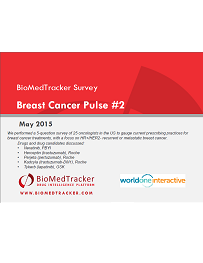Report Library
All Reports
2015 Breast Cancer Pulse #2
May 26, 2015
This 5-question pulse of 24 oncologists practicing in the United States focuses on the usage of HER2-targeted agents for the treatment of
breast
cancer. Although Herceptin (trastuzumab) remains the mainstay of treatment in all settings for patients with HER2-positive disease,
Genentech/Roche is pushing forward with clinical trials for Perjeta (in combination with Herceptin) and Kadcyla as Herceptin's patent
expiration dates loom closer. Roche hopes to position Kadcyla as a less-toxic alternative to Herceptin + chemotherapy in the first-line
metastatic setting (MARIANNE trial) and Perjeta as an add-on to
Herceptin in patients with early breast cancer.
Meanwhile, Puma Biotechnology (PBYI) hopes to gain approval for its irreversible EGFR/HER2 inhibitor neratinib, which the sponsor licensed from Wyeth/Pfizer. This agent reduces disease recurrence rate for some early-stage breast cancer patients in the post- Herceptin adjuvant setting. An approval for Puma in this setting will allow the company to gain a foothold in a market that GSK sought to break into with Tykerb (lapatinib), another oral EGFR/HER2 TKI that is used primarily in the metastatic setting.
Furthermore, we provide a comparison with physician views on many of these agents from an April 2014 pulse.
The following drugs are discussed in this pulse:
To purchase this survey, click the link at the top of the page.
For our disclosures, please read the BioMedTracker Research Standards.
Meanwhile, Puma Biotechnology (PBYI) hopes to gain approval for its irreversible EGFR/HER2 inhibitor neratinib, which the sponsor licensed from Wyeth/Pfizer. This agent reduces disease recurrence rate for some early-stage breast cancer patients in the post- Herceptin adjuvant setting. An approval for Puma in this setting will allow the company to gain a foothold in a market that GSK sought to break into with Tykerb (lapatinib), another oral EGFR/HER2 TKI that is used primarily in the metastatic setting.
Furthermore, we provide a comparison with physician views on many of these agents from an April 2014 pulse.
The following drugs are discussed in this pulse:
- Neratinib (PBYI)
- Herceptin (trastuzumab, Roche)
- Perjeta (pertuzumab, Roche)
- Kadcyla (trastuzumab-DM1, Roche)
- Tykerb (lapatinib, GSK)
To purchase this survey, click the link at the top of the page.
For our disclosures, please read the BioMedTracker Research Standards.
| Indications Covered: | Breast Cancer |
Additional Resources:
